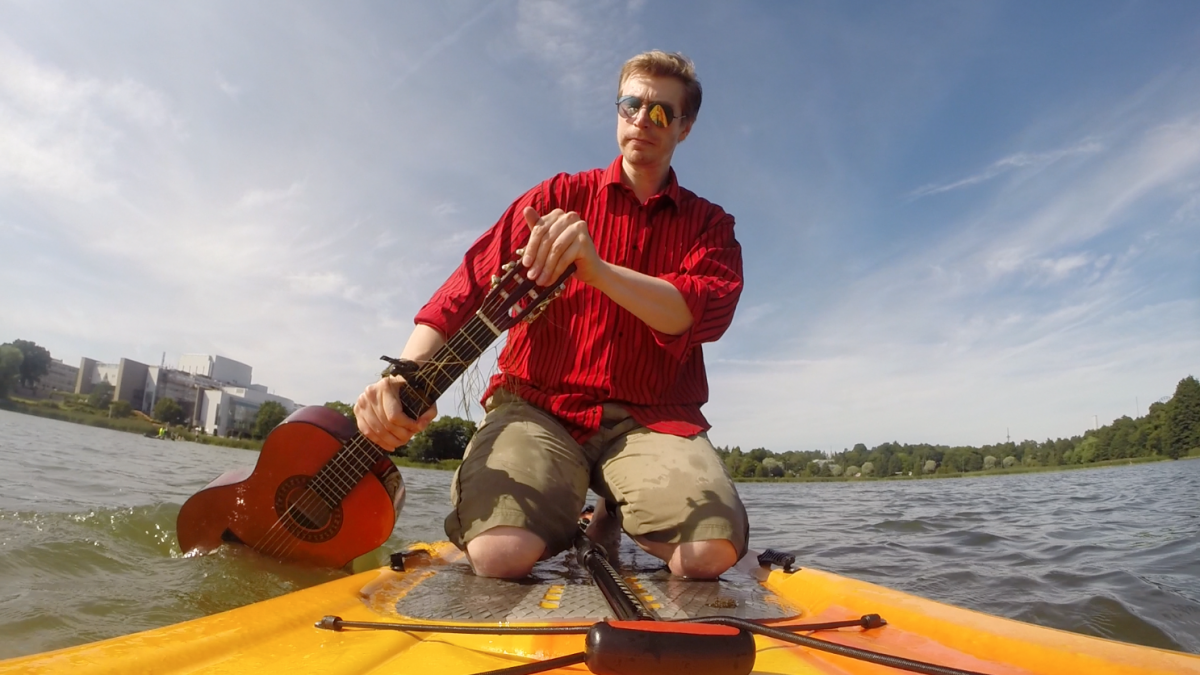What we talk about when we talk about music
Pessi Parviainen reflects on the etymology and history of the word music and cultural ways of using it. His artistic research When nothing is called music: towards ecological composition includes written research and cinematographic research titled “Töölönlahti, A Parable in Landscape”.

In his research, Pessi Parviainen (born in 1977) reflects on what we need the concept of music for, as we have concrete words like playing and singing.
“Our perceptions of art and our ways of verbalising art influence the way we think. The Greek word muse that the word music comes from, was originally a religious concept. On the other hand, Ancient Hebrew, which was used to write the Old Testament in the Bible, does not have the word music. Instead, Ancient Hebrew has many concrete words like playing and singing that do not evaluate the production of sounds in a religious fashion,” Parviainen says.
Research that has significantly influenced his thinking include studies on composed theatre, the philosophy of language, and cognitive linguistics, in particular, the work of Lera Boroditsky, who is known for the concept of linguistic relativism. As an artist, Parviainen has a diverse background from making sculptures to music and theatre.
“I studied sculpture at Turun piirustuskoulu (today called Turku Arts Academy) and I got interested in building instruments. I have always played in bands and taken part in performance art. I did a multidisciplinary master’s programme at the Simon Fraser University School for the Contemporary Arts in Vancouver, Canada. I took part in experimental composed theatre there, which differs from the tradition of musical theatre.”
Parviainen did his research at the Performing Arts Research Centre (Tutke) at Uniarts Helsinki’s Theatre Academy. He studies playing and singing as part of a performance or as a part of certain environment, for example a city.
“If nothing was called music, it would set us free from the heavy load of the concept and liberate our creativity. Concepts affect cognition and the way we act. Anyone can play an instrument or sing without being a musician. In my research, I suggest that artistic discourse would benefit significantly from avoiding dogmatic concepts like music.”
Parviainen believes that artistic research adds to our understanding of making art by combining non-linguistic and linguistic expression.
“Artistic research is needed particularly when artistic practice exposes a problem in the discourse concerning that practice. Playing and singing happen among people that are part of a society and they should not be closed off from others on a separate an inefficient island of art. Different types of creativity should be part of the community and business life.”
In his essay movie Töölönlahti, A Parable in Landscape, Parviainen films, for instance, a train arriving at the Helsinki railway station as seen and heard from the cab of a locomotive. The sound of a train is repeated later, when a drummer sitting on a railway bridge mimics the sounds around him, like snow crunching under the steps of passers-by and the rhythm of a passing train. The movie includes documentary clips of various events around Töölönlahti bay and their soundscapes, old film clips, sounds from the street, and people playing instruments in different places around Töölönlahti.
“In the movie, four people playing instruments relate to the Töölönlahti scenery in their own way. When I write about the ecology of composing, I mean playing and singing form a relationship with the environment of the performance and take it into consideration. This relationship is emphasised in the street environment where the soundscape is a complex combination of sounds produced by people and nature,” Parviainen explains.
Parviainen’s research was funded by The Kone Foundation, The City of Helsinki, The Risto Mäenpää Foundation, and Uniarts Helsinki’s Theatre Academy.
The essay movie is on Youtube.
Text by Päivi Brink
Pessi Parviainen’s doctoral research will be presented for public examination on Friday 23 October 2020 at 12 o’clock at the University of the Arts Helsinki’s Theatre Academy.